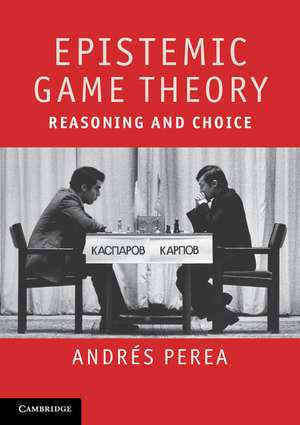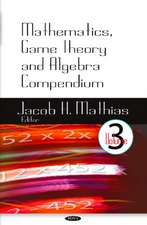Epistemic Game Theory: Reasoning and Choice
Autor Andrés Pereaen Limba Engleză Paperback – 6 iun 2012
| Toate formatele și edițiile | Preț | Express |
|---|---|---|
| Paperback (1) | 454.70 lei 6-8 săpt. | |
| Cambridge University Press – 6 iun 2012 | 454.70 lei 6-8 săpt. | |
| Hardback (1) | 768.58 lei 6-8 săpt. | |
| Cambridge University Press – 6 iun 2012 | 768.58 lei 6-8 săpt. |
Preț: 454.70 lei
Nou
Puncte Express: 682
Preț estimativ în valută:
87.02€ • 90.51$ • 71.84£
87.02€ • 90.51$ • 71.84£
Carte tipărită la comandă
Livrare economică 14-28 aprilie
Preluare comenzi: 021 569.72.76
Specificații
ISBN-13: 9781107401396
ISBN-10: 1107401399
Pagini: 580
Ilustrații: 54 b/w illus. 117 tables
Dimensiuni: 173 x 244 x 28 mm
Greutate: 1.13 kg
Editura: Cambridge University Press
Colecția Cambridge University Press
Locul publicării:New York, United States
ISBN-10: 1107401399
Pagini: 580
Ilustrații: 54 b/w illus. 117 tables
Dimensiuni: 173 x 244 x 28 mm
Greutate: 1.13 kg
Editura: Cambridge University Press
Colecția Cambridge University Press
Locul publicării:New York, United States
Cuprins
Acknowledgements; 1. Introduction; Part I. Standard Beliefs in Static Games: 2. Belief in the opponents' rationality; 3. Common belief in rationality; 4. Simple belief hierarchies; Part II. Lexicographic Beliefs in Static Games: 5. Primary belief in the opponent's rationality; 6. Respecting the opponent's preferences; 7. Assuming the opponent's rationality; Part III. Conditional Beliefs in Dynamic Games: 8. Belief in the opponents' future rationality; 9. Strong belief in the opponents' rationality; Bibliography; Index.
Descriere
The first textbook to explain the principles of epistemic game theory.















